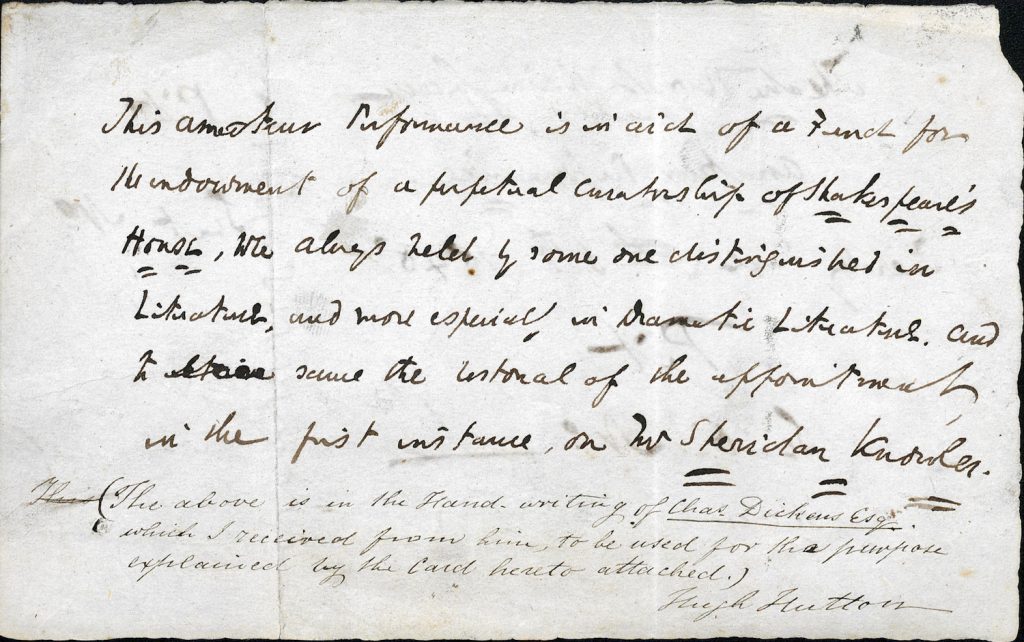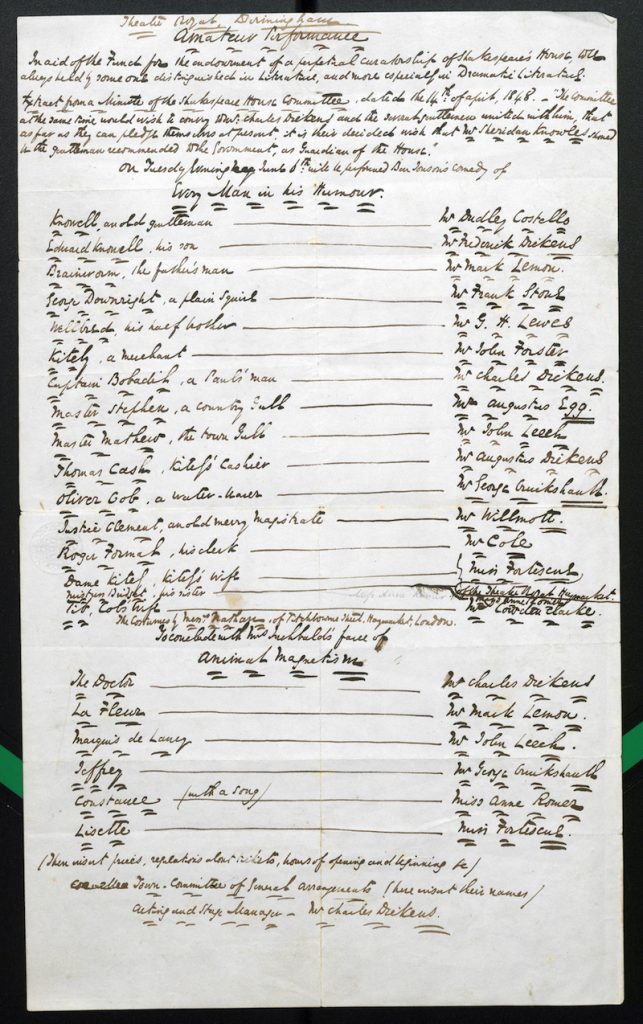Martin Killeen
is Head of Rare Books at the Cadbury Research Library. Thanks to his specialism, he has a unique insight into the resources of the library’s collection. In this post, based on the library’s Dickens holdings (including an original manuscript playbill and ticket for the event), Martin traces how the novelist came to put on a performance in Birmingham.
In 1847, the London and Stratford Shakespeare Committee had bought Shakespeare’s House and was looking for a Birthplace administrator. Charles Dickens, who sat on the Committee, recommended the dramatist James Sheridan Knowles. Knowles, however, had recently been declared bankrupt so Dickens planned to stage amateur theatricals to raise money for an endowment fund. Two productions were held in 1848 at The Haymarket in London and others followed at Manchester, Liverpool, Birmingham (twice), Edinburgh and Glasgow (twice). In the end, no appointment to the position of Shakespeare House curator was made but profits from the tour were presented in a lump sum of £576 to Knowles in October later that year (Letters, p.423).
Dickens felt the opening shows in London were poorly managed: ‘the Shakespeare House Committee not being good men of business, I have resolved to take the country arrangements into my own hands’ (Letters, p.310). Characteristically, he shouldered responsibility for all matters relating to running this theatrical venture in the provinces. He planned and directed all the rehearsals and liaised with theatre managers and musical conductors. In addition he prepared the schedule and itinerary and organized the publicity arrangements. His micromanaging went down to the level of ‘tickets, bills and everything that is to be in print’ (Letters, p.295). He outlined his method when he was trying to secure a venue in Edinburgh: ‘Whenever we act out of London, a Committee is formed of the most eminent men in the place whose names are reprinted in the advertisements as a Committee of general direction, and one of them is a Secretary, who superintends the taking of the Theatre for us, the advertizing, issuing of the tickets and so forth, and who employs such local assistance (paid for) as he thinks proper. To him I transmit the form of the bill [and] ticket’ (Letters, p.329).
Dickens corresponded with Charles Evans, Honorary Secretary of the Birmingham Polytechnic, to propose a performance in Birmingham (Letters, pp.309-310). In his letter of 22 May 1848 Dickens congratulated Evans on ‘the instant formation of the committee and announcement of the thing all over the town’, concluding that he was delighted to see Evans rush into ‘the grand preliminaries… like an Express Train’ and enclosing draft copies of both the playbill and even the ticket (we now hold originals at the Cadbury Research Library, University of Birmingham: ).

Evans had evidently followed Dickens’s advice ‘to take the field, if it is to be taken at all, with a rush, and without the loss of a day’ (Letters, p.311). It was settled that on Tuesday 6 June the Company would perform Jonson’s Every man in his humour and Mrs Inchbald’s Animal magnetism -‘a farce that made the people here roar with laughter’ (MS 147). Shortly afterwards on 26 May 1848 Dickens attended a meeting of the Birmingham local Amateur Theatricals Committee. Following a visit to the Theatre he noted that ‘All looks brilliant’ (Letters, p.320). Two days later Dickens wrote to Mark Lemon from the Royal Hotel, Birmingham, that ‘All is going on, well. Excellent committee here, of all parties and persuasions. High prices, big posters, and great confidence. Theatre a little more dingy than I expected but a good one. Town very much excited on the subject’ (Letters, p.323).
Apart from Dickens himself several leading members of the literary establishment appeared on the list of actors on the playbill. Included were: George Cruikshank, illustrator; George Henry Lewes, writer and partner of George Eliot; John Forster, historian and biographer of Dickens; Mark Lemon, a founding editor of Punch; Dudley Costello, journalist and novelist; John Leech, humorous artist and contributor to Punch; Augustus Egg, painter; Mary Cowden Clarke, compiler of the standard Shakespeare concordance; and Sheridan Knowles, dramatist and actor. Recognition was given to the ‘Town Committee of general arrangements / here insert their names’ with the final credit: ‘Acting and Stage Manager – Mr Charles Dickens’ (MS 147).

The performance on the first night in Birmingham was a triumphant success with long and favourable reviews in the local press. In her memoir Mary Cowden Clarke recalled details of the tour and of this performance: ‘What times those were! What rapturous audiences a-tiptoe with expectation to see, hear, and welcome those whom they had known and loved through their written or delineated productions…What enthusiastic hurrahs at rise of the curtain…Of course, in general, the storm of plaudits was loudest when Charles Dickens was recognized; but at Birmingham such a rave of delight was heard at an unaccustomed point of the play that we…exclaimed, “Why, who’s that gone on to the stage?” It proved to be George Cruikshanks (sic), whose series of admirably impressive pictures called “The Bottle” and “The Drunkards Children” had lately appeared in Birmingham, and had been known to have wrought some wonderful effects in the way of restraining men from immoderate use of drink’ (Recollections, p.314). And three days later Dickens wrote to John T Lawrence, Chairman of the Birmingham Theatricals Committee, saying that he was ‘delighted to find that we have left so agreeable an impression in Birmingham. I am very confident indeed that our second night’s performance (which is certainly a better one) will not disappoint our good friends there’ (Letters, p.335).
Throughout this period Dickens’s correspondence is full of his customary drive and urgent energy. The frenzied excitement and pressure of the enterprise is vividly expressed in some sample phrases: ‘another iron should be got into the managerial fire, without delay’; ‘I have sent (through the Post) a small red hot poker for the stirring up of those gentlemen’; ‘I am so perpetually engaged in drilling the forces’; ‘I am quite horror-stricken to find no advertisement’; ‘I write in a ferocious state of business and botheration’; ‘I am up to the eyes in L’pool and Birmingham correspondence’; ‘I am like an over-driven-bull’; and ‘I look out of the sea of business which is overwhelming me and [shake] the spray thereof from my bothered hair’ (Letters, passim pp. 285-339). And yet it appeared to those around him, as Mary Cowden Clarke recalled, that during this tour ‘there was a positive sparkle… of holiday sunshine about him; he seemed to radiate brightness and enjoyment from his own centre and cast lustre upon all around him’ (Recollections, p.319). Another eye-witness account of these events, penned by John Forster, close friend and biographer of Dickens, confirms this view of the novelist in his theatrical element: ‘everywhere Dickens was the leading figure. In the enjoyment as in the labour he was the first. His animal spirits, unresting and supreme, were the attraction of rehearsal in the morning, and of the stage at night. At the quiet early dinner, and the more jovial unrestrained supper, where all engaged were assembled daily, his was the brightest face, the lightest step, the pleasantest word. There seemed to be no need for rest to that wonderful vitality’ (Life, vol II, p.18).
This blog post has been adapted from the paper: Martin Killeen, ‘Charles Dickens at the Theatre Royal, Birmingham, 1848’ Research Libraries Bulletin, 7, Spring 2000, 8-12
Please cite this blog post as follows: Killeen, M. (2018, March 12). ‘High prices, big posters, and great confidence … Town very much excited on the subject’: Charles Dickens on the Birmingham stage in 1848 [Blog post]. Retrieved from https://blog.bham.ac.uk/clic-dickens/2018/03/12/dickens-on-the-birmingham-stage-in-1848
References
- Papers relating to Charles Dickens’ Amateur Theatrical Company, 1848-1948 (Cadbury Research Library MS147)
- Graham Storey & K J Fielding (Eds), The letters of Charles Dickens, volume five 1847-1849, The Pilgrim Edition (Oxford, 1981)
- John Forster, The Life of Charles Dickens, 2 vols (London, 1966)
- Charles and Mary Cowden Clarke, Recollections of writers (Fontwell, 1969)

Join the discussion
0 people are already talking about this, why not let us know what you think?